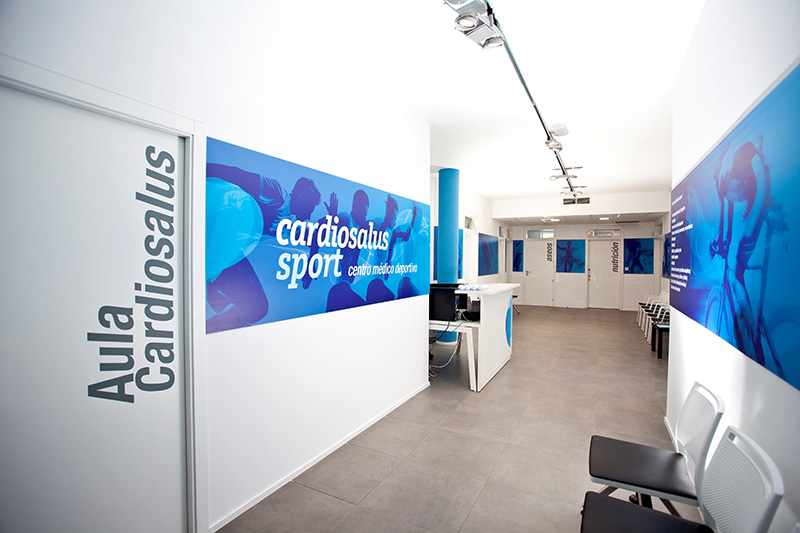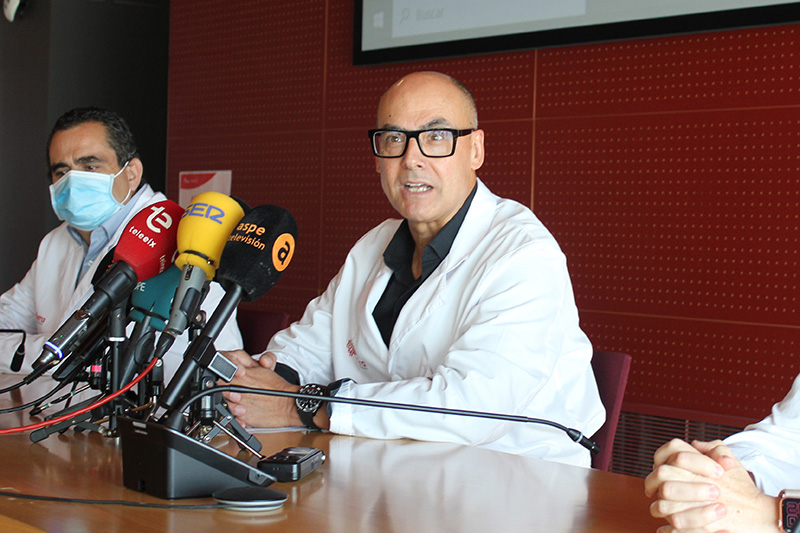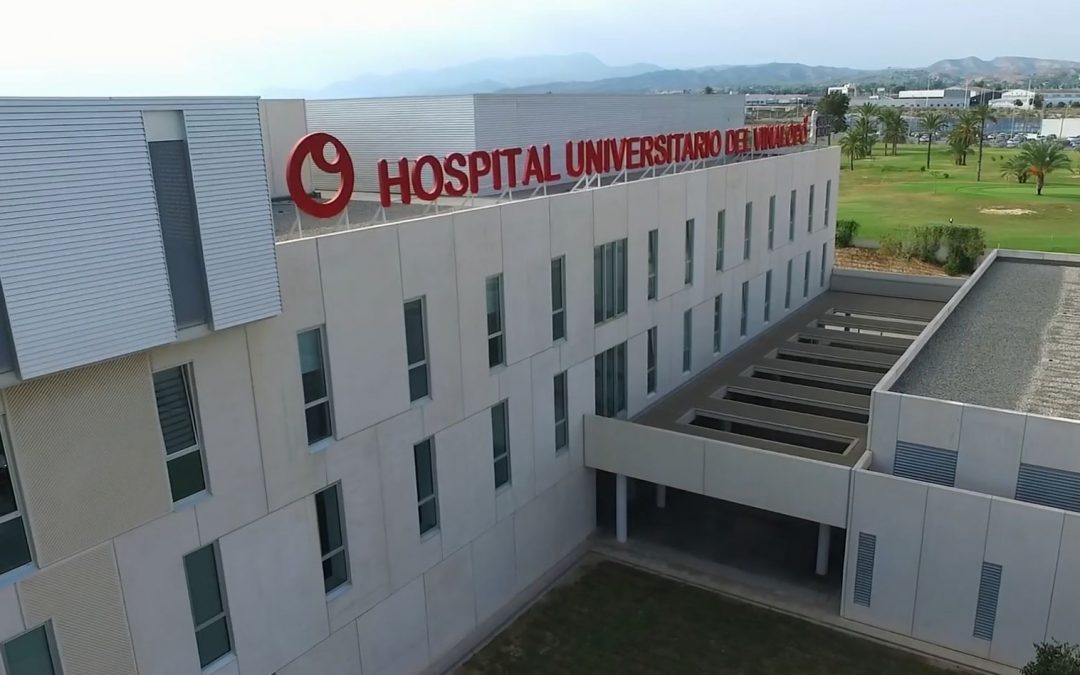
by S0p0rt3 | Jun 22, 2023 | Ribera |
- These awards, leaders in the health sector and with 27 years of experience, reward the creativity of health products and services as well as the communication that companies make of these products and services.
- The Ribera health group has already received several awards that recognise its commitment to design and imagination to highlight the importance of disease prevention and present formats and actions that are more attractive to citizens.
This year’s Aspid awards have recognised the originality and great acceptance among patients of Lola, the virtual caregiver of the Ribera healthcare group, as well as the creativity of the cardiovascular disease prevention campaign, Ritmos de Vida, with gold and silver awards respectively. These awards, leaders in the health sector and with 27 years of experience, reward the creativity of both health products and services and the communication that companies make of them.
Lola, the virtual caregiver of the Ribera healthcare group, developed in collaboration with the startup Tucuvi, is a voice and artificial intelligence technology that already allows several of the group’s hospitals to remotely monitor and control thousands of patients with various pathologies related to respiratory problems, such as COPD, as well as palliative patients, whether oncological or not. Lola is a platform capable of making multiple calls in a short interval of time without the patient needing advanced technology beyond a telephone. This virtual caregiver collects and processes all the information provided by the patient, to whom she asks the appropriate questions. In the event of decompensation of the patient’s vital signs or any sign of worsening health, she issues the corresponding alert for a healthcare professional to contact the patient.
Ritmos de Vida, on the other hand, is one of the most recent health campaigns of the Ribera health group that has already been awarded and recognised by organisations and events in the health sector, but also in the creative field, for its originality and impact. Ritmos de Vida unites health and music to raise awareness of cardiovascular diseases and the associated risk factors, with a singular and unique element, the first ever arrhythmic metronome, which sways to the “rhythm” of Adrian’s sick heart, a patient with arrhythmia. This purpose-built metronome is the centrepiece of a series of initiatives organised by the healthcare group in its hospitals and clinics, all linked to cardiovascular health awareness and education for its patients. These include, among others, a travelling exhibition in the group’s hospitals, musical compositions recorded to the rhythm of this metronome, awareness-raising sessions with patients and a website with healthy advice on how to take care of the heart. Ribera has worked on this initiative with Maart Agency, responsible for the creative idea, and with Estudio Espadaysantacruz, manufacturer of the personalised arrhythmic metronome.
The Aspid awards ceremony took place on Tuesday afternoon at the World Trade Center in Barcelona, and those in charge of collecting the awards were Ribera’s Digital Transformation Officer, Tania Menéndez, and the group’s Brand Manager, Mónica Jaén, together with doctors Maikel Ayo, Hospital Medical Services Lead of the Ribera healthcare group, and Guillermo Losa, head of the Home Hospitalisation service of the Hospital Universitario del Vinalopó, and Mireia Martínez, Project Manager of Tucuvi.

by S0p0rt3 | Jun 21, 2023 | Ribera |
- The Murcian group has clinics specialising in the diagnosis, treatment and prevention of cardiovascular diseases and with professionals in Cardiology, Sports Medicine, Physiotherapy and Traumatology, Endocrinology and Nutrition, among others.
The Ribera healthcare group has invested in Cardiosalus, a group of clinics specialising in the diagnosis, treatment and prevention of heart disease, with professionals specialising in Cardiology, Sports Medicine, Traumatology, Physiotherapy, Digestive System, Urology, Endocrinology, Dermatology and Cosmetic Medicine, Clinical and Sports Nutrition, and which is a benchmark in the Region of Murcia.
Ribera, which enters the project with a majority stake, aims to help Cardiosalus’ professionals to give a new boost to its activity and growth, while the group continues its expansion in this autonomous community, where it already manages the Virgen de la Caridad medical group, with hospitals in Cartagena and Caravaca and 32 polyclinics in the region, as well as Ribera Hospital de Molina, in Molina de Segura.
Ribera’s entry into Cardiosalus confirms its commitment to the Region of Murcia and the growth of its services and specialised areas, for the personalised approach of patients seeking a comprehensive improvement for the treatment of a pathology or for the prevention of illnesses and to improve their state of health. The Ribera Group has, among others, a Heart Area, a Breast Area, the Radiological Ring, or the Ribera Lab laboratories, among others.
The Cardiosalus clinics in Murcia have professionals specialised in cardiology, cardiac rehabilitation, medical check-ups, physiotherapy and sports rehabilitation, clinical and sports nutrition. It also offers its patients a global approach with the latest diagnostic technology, for example, in the performance of echocardiography, stress tests with ergospirometry and 3D biomechanics, the measurement of blood and genetic biomarkers, as well as the latest techniques for the treatment of muscle and joint injuries with echodirected echocardiography.
For the CEO of the Ribera healthcare group, the Cardiosalus project “is a very valuable addition to the group’s expansion in the Iberian Peninsula, but especially in the Region of Murcia”. She also assures that “personalised and precision medicine in specialised areas allows us to have the best professionals in Spain to improve these services, in a transversal way, in all our hospitals and clinics”.
For the directors and professionals of the Cardiosalus group, the entry of the Ribera health group represents “a very important boost from a national and international reference group, to a pioneering project in our Region that wants to continue growing: “We have always believed in our health and prevention project, and our slogan – we care for your health – reflects our objective from day one, and the Ribera group has this same philosophy, so by joining their health experience we can care for and give health to many more people”.

by S0p0rt3 | Jun 20, 2023 | Ribera |
- The ODELIA research project aims to “overcome the obstacles of collecting information on patients’ health with guarantees” in order to advance early, better and more accurate diagnosis and treatment.
The Ribera healthcare group is participating in a European research project, christened ODELIA, which seeks to facilitate the massive analysis of patient data, thanks to Artificial Intelligence (AI) to prevent breast cancer. Specifically, and as explained by ODELIA’s management, this project aims to “overcome the obstacles to the collection of information on the health of patients with guarantees”, to advance in early, better and more accurate diagnosis and treatment of different pathologies, especially of some types of cancer, such as breast cancer.
Ribera is a leader in the diagnosis and treatment of breast cancer, with a Breast Area headed by Dr. Julia Camps and made up of a multidisciplinary team of almost a hundred professionals. The participation of the Ribera health group, through its foundation, in this European project allows it to form part of the team that is already designing open source software to develop the first clinically useful AI algorithm for the detection of breast cancer in magnetic resonance imaging.
About Odelia
The ODELIA consortium brings together partners from twelve academic institutions and industrial partners from across Europe, namely: European Institute for Biomedical Imaging Research (Austria), Aachen University Hospital (Germany), Vall d’Hebron Institute of Oncology (Spain), Mitera Hospita (Greece), Radboud University Medical Center (The Netherlands), University Medical Center Utrecht (The Netherlands), the Ribera Health Group (Spain), Fraunhofer Institute for Digital Medicine MEVIS (Germany), OSMIS (Belgium), Technische Universität Dresden (Germany), University of Zurich (Switzerland) and the University of Cambridge (UK). The project will run until December 2027 and has funding of around €8.6 million.

by S0p0rt3 | Jun 14, 2023 | Ribera |
- Investment of 140 million euros in the Vinalopó Health Department in infrastructures, equipment and technology
- 13 years with delays below the average for public hospitals and benchmark specialities
- Vinalopó is the only department in the Valencian Community with the Joint Commission International accreditation and the first in Spain with the certification of the Cardiac Surgery service.
The Vinalopó health department, managed by the Ribera health group, celebrates its thirteenth anniversary since it was founded on 1 June 2010. Thirteen years of tireless work that has set a fixed roadmap: to offer excellent care of the highest quality to the department’s patients.
With this in mind, the centre’s management is working on a Strategic Plan for the Health Department that will be developed over the next few years and shows Ribera’s commitment to different lines of work: mental health, primary care, the heart area and waiting lists.
In a context in which mental health plays a fundamental role in the prevention of complex illnesses, Vinalopó has included this speciality in its roadmap with a comprehensive care plan that includes a commitment to super-specialised units to offer a more personalised response to the patient.
On the other hand, the manager Rafael Carrasco, has highlighted the commitment to develop a specific plan to attract talent, designed at national level with the People Management of Ribera, and especially aimed at primary care professionals, given the difficult time that this speciality is going through at national level due to the shortage of doctors. “Primary care comes first” is the slogan of this campaign, which aims to strengthen health centres and offer a more immediate response to patients. In this sense, Ribera also has innovative care formulas in the primary care area, such as the chronic care plan, artificial intelligence, YOsalud and the Shared Demand Management Plan, which enable it to improve response times and delays.
As for the heart area, the strategic plan includes a review of emergency care in the southern area of Alicante and even in the province. “Elche has gained in coronary care but we can still improve. We have to work to guarantee the best care for our patients,” explained Rafael Carrasco.
13 years at the forefront of Valencian health care
The Vinalopó University Hospital and its network of health centres have become one of the best health centres in the region in terms of quality of care and accessibility. This has been thanks to the strong investment that the group has allocated to the Department since its inception. Ribera has already invested around 140 million euros in technology, infrastructure, human resources and other healthcare and humanisation projects in these first 13 years. In 2023 alone, the hospital has incorporated a SPECT-CT scanner in the Nuclear Medicine area, a technology not available in other centres and which places the service at the forefront of cutting-edge technology.
In terms of healthcare quality, it is worth remembering that Vinalopó was the first centre in Spain and the second in Europe to achieve Joint Commission International certification for the Cardiac Surgery service. It is also the only health department in the Valencian Community with all its primary care centres and hospital accredited globally by this prestigious accrediting body.
“We are proud to celebrate thirteen years with these certifications. We have ratified the guarantee and excellence that we provide to our patients by complying with the most demanding international standards of quality and safety,” says Dr. Rafael Carrasco, manager of the department.
The hospital and health centres work every day to maintain excellence in care indicators. In this respect, waiting times remain below the average for public hospitals. In addition, it should be noted that the hospital is part of transversal projects at national level, such as the corporate Breast Unit or the Ribera Heart Area.
On a social level, Vinalopó has consolidated its position as a responsible organisation with initiatives such as Patient Council meetings, dissemination projects, volunteering activities and other actions related to sustainability and aligned with the Sustainable Development Goals of Agenda 2030.
Dr. Carrasco insisted on the importance of placing the patient at the centre of all decisions, always thinking of offering the best care. In this regard, he recalled that the Vinalopó University Hospital has a wide range of services and reference specialities such as Cardiac Surgery, Nuclear Medicine, Haemodynamics, Thoracic Surgery and Vascular Surgery, among others. As well as reference units such as the delivery area that women from all over the province choose to bring their babies into the world.
In terms of the humanisation of healthcare, Vinalopó is a hospital with an innovative vocation, being one of the few centres in Spain to have a protocol for visiting pets for long-stay patients, as well as a plan for severe or serious functional diversity that guarantees universal accessibility in healthcare, improving the experience of patients and their quality of life.
Excellent results
The management team of the centre has presented the balance of activity of these 13 years of activity.
- Interventions: 204,842
- No-admission surgery rate: 70%.
- First consultations: 1.349.967
- Subsequent consultations: 3.924.026
- Births: 19,398
- Evidence:
- Radiological: 2,303,638
- PET-TAC: 45,612
- Anatomical Pathology: 272,823
- Hospital emergencies: 1.109.318
- Hospital emergencies + health centres: 1,736,318

by S0p0rt3 | Jun 12, 2023 | Ribera |
- Vinalopó is the second centre in the province of Alicante and the only hospital in Elche to carry out this type of intervention.
- The 51-year-old patient, who underwent heart surgery for two valvular heart diseases, was discharged after 48 hours.
- The leadless pacemaker is 93% smaller and reduces the likelihood of complications from conventional pacemakers.
The Hospital Universitario del Vinalopó, part of the Ribera healthcare group, has successfully implanted the first pacemaker without wires, making it the first hospital in Elche and the second in the province of Alicante to perform this type of intervention. It is a device that eliminates complications related to the manipulation of the wires for connection to the heart through the veins. It is also an improvement due to its reduced size (93% smaller) and the elimination of the subcutaneous pocket where conventional pacemakers are placed.
The Electrophysiology and Arrhythmia Unit has implanted this first device in a 51-year-old patient who had undergone heart surgery for two valvular heart diseases and who, after the operation, required a pacemaker implant. “We decided to implant the device without wires to avoid any damage to the tricuspid valve that had been operated on. After the intervention, the patient was discharged after 48 hours in perfect health,” explains Dr. Luis González, head of the Unit.
Pacemakers are implantable devices used to treat people with certain heart rhythm disorders. “They require a surgical procedure that involves implanting an electrical pulse generator (battery) and an intravenous electrode lead. One end of the electrode is placed on the inner wall of the heart and the other end is connected to the generator”.
Conventional pacemakers require the doctor to make a surgical incision in the chest, where the pacemaker sits in a ‘pocket’ that forms permanently under the skin. The doctor then implants the pacemaker leads through the veins to reach the heart.
Wireless and 93% smaller
By being placed directly into the heart without the need for a surgical pocket or pacing wires, leadless pacemakers reduce the risk of complications. The device, designed by Medtronic, is 93% smaller than a conventional pacemaker, measuring about 2.5 centimetres, has a volume of 0.8 cubic centimetres and weighs only 2 grams. It consists of a pulse generator that includes a battery and an electrode that sends impulses to the heart when it recognises a problem with the heart rhythm and has legs that serve to anchor it to the wall of the right ventricle.
The leadless pacemaker offers a minimally invasive option as it is implanted through the femoral vein with a steerable catheter, eliminating the need for a surgical pocket and leads, reducing the overall incidence of complications by about 50%. It also increases patient satisfaction because it does not leave scars or bulges under the skin.






Recent Comments